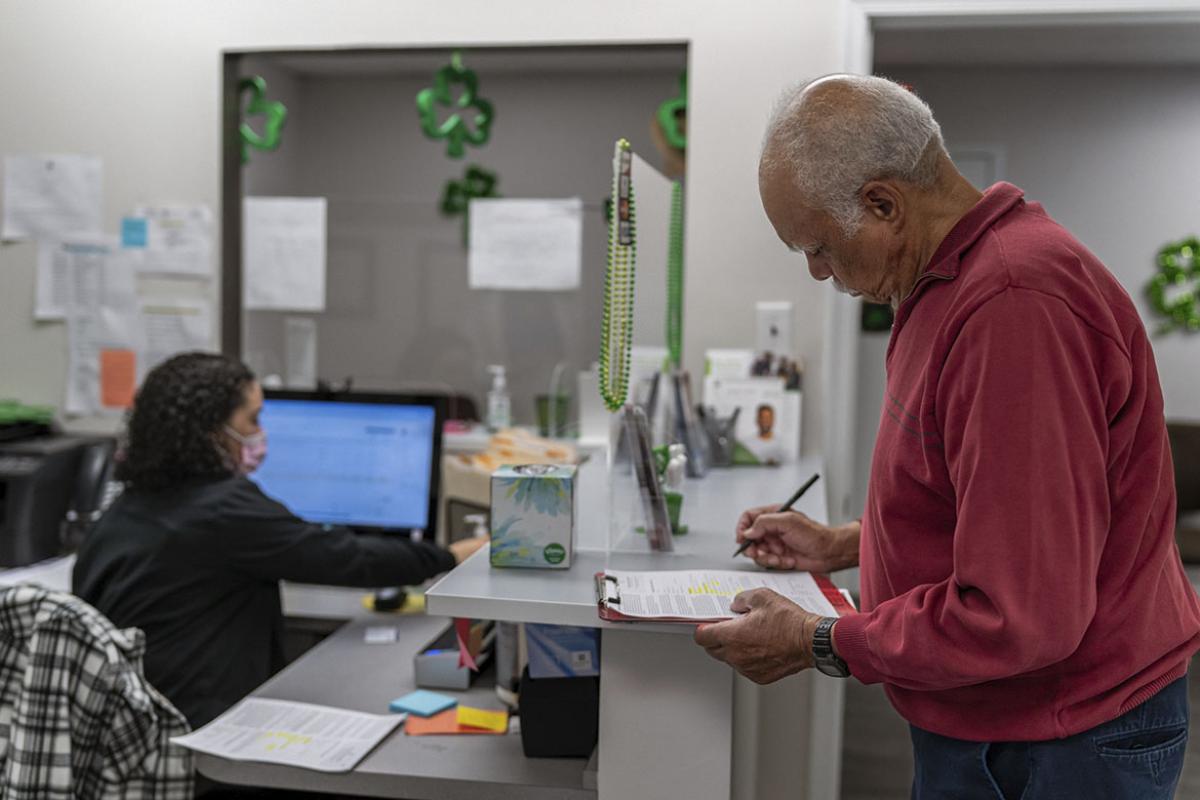Contents
- Committee on American Indian Affairs
- Committee on Bioethics & Humanities (CBH)
- Committee on Disability Affairs
- Committee on Economics & Quality in Medicine (CEQM)
- Committee on Global & Public Health (CGPH)
- Committee on Health Information Technology (CHIT)
- Committee on Impact, Policy, and Action (IMPACT)
- Committee on Legislation & Advocacy (COLA)
- Committee on LGBTQ+ Affairs
- Committee on Long Range Planning (COLRP)
- Committee on Medical Education (CME)
- Committee on Scientific Issues (CSI)
- Community Service Committee (CSC)
- Membership, Engagement & Recruitment Committee (MERC)
- Minority Issues Committee (MIC)
- Women in Medicine Committee (WIM)
Each year, the MSS Governing Council appoints AMA medical student members to serve on its standing committees. These AMA committees support the governing council in a number of ways, and responsibilities vary across the committees.
Review the charters (PDF) for each standing committee.
Committee on American Indian Affairs
Committee on American Indian Affairs
Objectives:
- Work closely with national American Indian advocacy organizations (e.g., National Indian Health Board, National Congress of American Indians) to analyze and assess the policy landscape affecting Indian Country and align internal MSS and external HOD policy with the priorities of Tribal Nations.
- Support American Indian medical students with interests in organized medicine.
- Assist in the creation and the review of policy proposals related to Indian Affairs.
- To collaborate with other committees and groups within the AMA as policy issues and opportunities arise related to American Indian populations.
- To assess the need for and submit relevant programming events to educate the MSS on relevant policy issues that affect American Indian populations.
Committee on Bioethics & Humanities (CBH)
Committee on Bioethics & Humanities (CBH)
Objectives:
- To facilitate discussions on ethics and humanities with the larger AMA body.
- To advocate and educate on topics particularly focused on humanism and bioethics.
- To plan and submit a minimum of one humanities and ethics centered program for AMA national conferences.
- To grow and foster a relationship with the AMA Journal of Ethics and encourage student participation with the journal.
- To collaborate with other bodies within the AMA to develop ethical policies that consider a broad range of perspectives from an ethical standpoint.
- To promote member education through internal education through journal clubs, ongoing discussions and social media engagement.
Committee on Disability Affairs
Committee on Disability Affairs
Objectives:
- To promote awareness around people who are elevating disability issues in medicine, especially during the month of Disability Pride.
- To assist in the creation and the review of policy proposals related to disability issues.
- To collaborate with other committees and groups within the AMA as disability-related policy issues and opportunities arise.
- To provide an organizational network for those with disabilities within the AMA.
Committee on Economics & Quality in Medicine (CEQM)
Committee on Economics & Quality in Medicine (CEQM)
Objectives:
- To create two policy briefs on major contemporary issues.
- To enable continuous engagement through biannual educational webinars.
- To query and engage the MSS through social media.
- To mentor a corps of student members who engage deeply with health policy.
- To review MSS resolutions in preparation for the annual and interim meetings.
- To present high quality content and producing programming for the conferences.
Committee on Global & Public Health (CGPH)
Committee on Global & Public Health (CGPH)
Objectives:
- To raise awareness of current events in the U.S. and abroad that can affect the health of the general population.
- To educate and inform members of the effects of social determinants of health on the health of our patients and how they can be addressed in our delivery of care.
- To highlight the specific plights of groups due to varying sociopolitical and economic factors that may require special consideration by medical students and physicians.
- To advocate for health equity among all populations in the U.S. and abroad.
- To organize public health initiatives, establishing the AMA as a leader in improving public health.
Committee on Health Information Technology (CHIT)
Committee on Health Information Technology (CHIT)
Objectives:
- To author informational reports and provide policy recommendations related to health information technology (HIT) as tasked by the MSS Governing Council.
- To create robust health information technology policy via resolution writing.
- To engage the larger MSS by providing content via social media and programming relating to current developments in HIT.
Committee on Impact, Policy, and Action (IMPACT)
Committee on Impact, Policy, and Action (IMPACT)
Objectives:
- To provide a thorough review of all resolutions submitted to our MSS assembly and all resolutions and reports submitted to our HOD through the lens of MSS policy and HOD policy.
- To provide MSS authors with valuable feedback to enhance the quality and impact of their resolutions.
- To familiarize IMPACT members with the MSS policy cycle, policy review processes, and MSS relations with the HOD.
Committee on Legislation & Advocacy (COLA)
Committee on Legislation & Advocacy (COLA)
Objectives:
- To create and maintain a network of medical school sections to accomplish grassroots advocacy.
- To advance key student issues through educational initiatives at each national meeting.
- To assist with grassroots campaigns for specific Medical Student Section priority issues by providing strategy, sample letters, talking points and additional information and resources.
Committee on LGBTQ+ Affairs
Committee on LGBTQ+ Affairs
Objectives:
- Studies and reviews current public health issues pertaining to the sexual and gender minority populations.
- Addresses issues of concern through health education, policy development and education.
- Serves as an advisory body to the MSS assembly and governing council on sexual and gender minority affairs.
Committee on Long Range Planning (COLRP)
Committee on Long Range Planning (COLRP)
Objectives:
- To develop timely and comprehensive reports in response to governing council assignments and directives, which are considered items of business in the MSS assembly.
- To testify as subject matter experts for the MSS.
- To provide mentorship and feedback to medical students across the nation during the resolution writing process that precedes each national meeting.
- To develop and present programming on subject matter expertise at each national meeting.
Committee on Medical Education (CME)
Committee on Medical Education (CME)
Objectives:
- To review MSS resolutions in preparation for the annual and interim meetings.
- To develop educational programming for medical students, both virtual and in-person, at national meetings.
- To serve as the content experts on the field of medical education for the MSS.
- To advocate for student needs with regards to undergraduate and graduate medical education.
Committee on Scientific Issues (CSI)
Committee on Scientific Issues (CSI)
Objectives:
- To develop guides to address AMA policy gaps on novel scientific issues and serve as a reference to medical students who are interested in working on science-related resolutions.
- To engage with the AMA Research Challenge by selecting abstracts for the Medical Student Section and assisting during the event.
- To develop programming for national MSS meetings and organize talks, interviews and forums on scientific topics of interest.
- To serve as an informational resource to the Medical Student Section assembly on resolutions related to recent scientific developments and the integration of science into the medical education.
Community Service Committee (CSC)
Community Service Committee (CSC)
Objectives:
- To support the National Service Project, a nationwide AMA initiative currently directed to combat the opioid crisis
- To enable MSS participation by providing service opportunities at interim and annual meetings.
- To organize, market and execute these service opportunities, as well as to evaluate their impact and success.
- To support Region Community Service chairs in their initiatives.
- To encourage community service at the school level through activities like service project competitions and the Project Idea Book.
- To mentor a corps of student members who are passionate about the economic and social issues affecting their communities.
Membership, Engagement & Recruitment Committee (MERC)
Membership, Engagement & Recruitment Committee (MERC)
Objectives:
- To create tangible products that sections and region leadership can use to increase member recruitment and engagement.
- To work closely with staff to amplify existing recruitment efforts to increase membership in the MSS.
- To use social media and other platforms to increase the awareness of MSS member opportunities and to increase engagement.
- To work closely with the governing council and other standing committees to advertise their efforts and expand visibility of MSS projects.
- To coordinate outreach, informational and recruitment efforts between national, regional, state and medical school sections levels of involvement.
- To strive to find ways to further the value of AMA membership to medical students.
- To integrate and direct social media efforts for the Medical Student Section in conjunction with MSS leadership and staff.
Minority Issues Committee (MIC)
Minority Issues Committee (MIC)
Objectives:
- To raise awareness, educate and advocate for minority health issues and also those pertaining to minorities in medicine and in the AMA.
- To submit at least one programming event idea and one resolution about minority issues per AMA meeting (resolution cannot be submitted on behalf of the committee but as individuals).
- To collaborate with outside organizations, such as SNMA, LMSA and APAMSA, to better address minority issues as well as fostering better relationships with the MSS and these organizations.
- To work with the MSS Governing Council to bolster minority involvement and inclusion in the MSS and to bring up the unique perspectives of minority MSS members.
Women in Medicine Committee (WIM)
Women in Medicine Committee (WIM)
Objectives:
- To raise awareness of current events and issues in the U.S. and globally that can affect women’s health and women in medicine.
- To advocate for important topics related to women’s health.
- To be the voice of MSS for the unique needs, challenges and talents of female medical students.
- To promote mentorship between women in medicine.
Table of Contents
- Committee on American Indian Affairs
- Committee on Bioethics & Humanities (CBH)
- Committee on Disability Affairs
- Committee on Economics & Quality in Medicine (CEQM)
- Committee on Global & Public Health (CGPH)
- Committee on Health Information Technology (CHIT)
- Committee on Impact, Policy, and Action (IMPACT)
- Committee on Legislation & Advocacy (COLA)
- Committee on LGBTQ+ Affairs
- Committee on Long Range Planning (COLRP)
- Committee on Medical Education (CME)
- Committee on Scientific Issues (CSI)
- Community Service Committee (CSC)
- Membership, Engagement & Recruitment Committee (MERC)
- Minority Issues Committee (MIC)
- Women in Medicine Committee (WIM)



